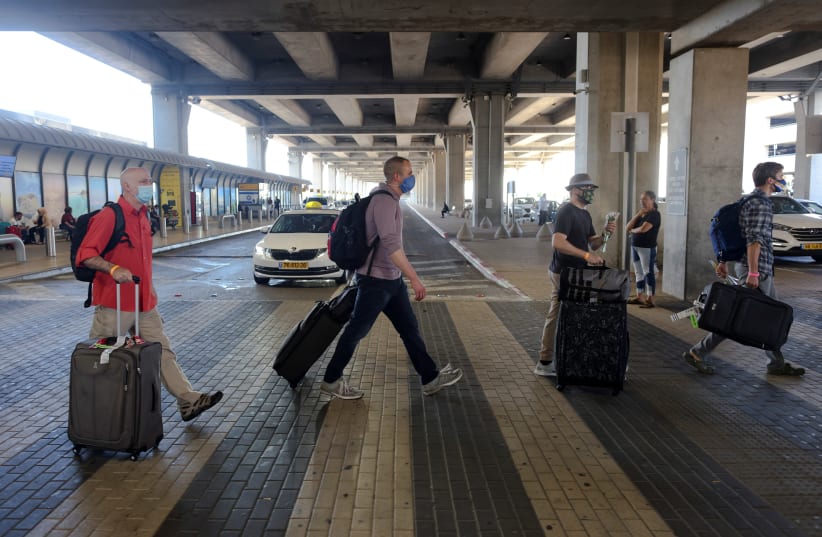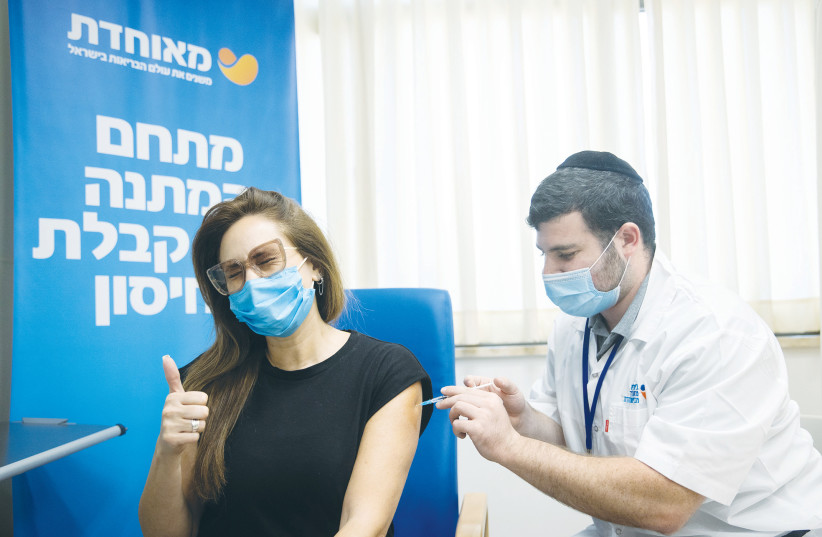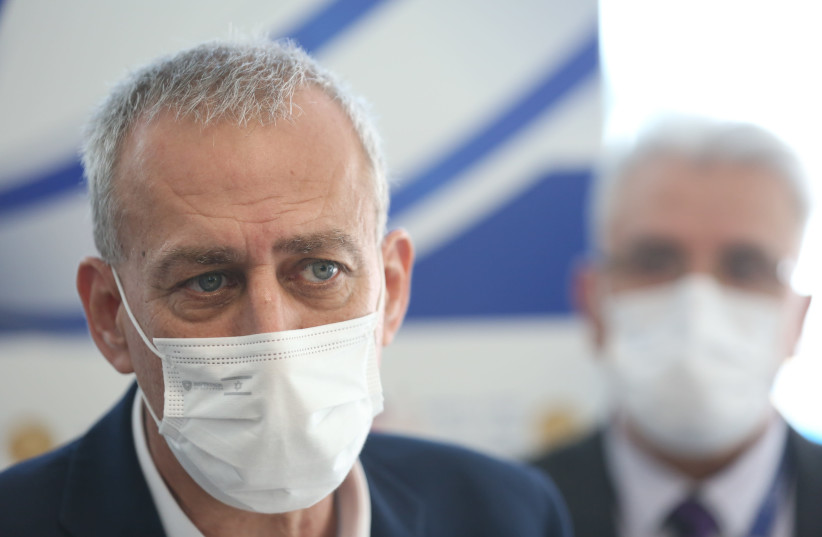Individuals vaccinated abroad can be released from isolation when they enter the country, provided that they meet the criteria set by the Health Ministry and they undergo a serological test in Israel, Health Ministry Director-General Prof. Nachman Ash said on Tuesday.
“Indeed, they can be released by telephone, under the same conditions of anyone who is vaccinated with a third shot or two vaccines administered not more than half a year earlier, provided that they do a serological test,” Ash told the Knesset Law and Constitution Committee, “Anyone who does a serological examination can already be discharged today.”
However, Israeli citizens are able to enter the country freely, including if they reside abroad. In addition, certain categories of foreign nationals – including vaccinated first-degree relatives of Israelis – have been able to apply and receive permission to enter the country.
Since the ministry published the new guidelines about isolation for travelers entering Israel that came into effect on September 3, the status of individuals vaccinated abroad has remained unclear.
According to the guidelines, incoming passengers who are a week after receiving a third shot, or have been vaccinated or recovered within the previous six months, or have recovered and also received one shot, can be exempt from full quarantine.
At the moment, Israel does not recognize any foreign vaccination or recovery documentation.
Non-citizens who want to enter the country have to present their certificates in order to receive the permission required to enter, but once in Israel, if they want to be considered immunized, they need to undergo a private serological test to prove the presence of antibodies.
Once they do, they also receive an Israeli recovery certificate based on the serology test performed in Israel and not elsewhere.
The ministry’s first statement on the new quarantine policy did not suggest that the exemption from isolation would not apply to individuals holding such certificates based on serology results.
Subsequent policy statements, however, required recovery certificates to be based on a PCR test performed in Israel.
On September 6, right before the beginning of Rosh Hashanah, former MK Rabbi Dov Lipman, an activist who recently established the NGO Yad L’Olim to help new immigrants navigate Israeli bureaucracy – first and foremost to help them receive permission for their families to visit the country – announced that the Health Ministry had changed its policy again, allowing people vaccinated or recovered abroad within the previous six months to also be exempt from isolation based on a serological test.
However, no change in policy was officially announced, and ministry spokesperson Anat Danieli Lev denied any new development. She said that the ministry was still working on the issue, specifically to solve the problem of proving the date of the latest vaccination/recovery, which the serological test cannot show.
On September 9, Ash reaffirmed that those who are vaccinated or recovered abroad at the moment need to isolate, but vowed to find a solution quickly.
“Because we used serological tests, we do not have information on the date of the vaccination,” he said. “We know we have to get organized fast to give a response to this problem. We are working on setting up a special call center to release those vaccinated abroad from quarantine.”
He did not specify when the center was going to be set up, or how the process was going to work.
Previously, serological test results had to be uploaded in a dedicated form on the Health Ministry’s website, which would then send an official email to those quarantined authorizing them to leave.
Ash told the committee on Tuesday that those needing to be released from quarantine needed to call the hotline, presumably in addition to sending the documents proving that they meet the criteria, and that the serological test was positive and confirmed the presence of antibodies against the coronavirus in the blood.
Lipman, who has been advising olim on how to approach the issue since he was first informed about the new policy, said that everyone needed to provide all the information and wait until the ministry’s approval before leaving isolation.
“It is important to follow the full procedure, or you can end up waiting for days to be released from quarantine,” he said. “You should send the Health Ministry the serological test results, the negative PCR results from arrival, the vaccination or recovery certificate, and your passport. With all that you should get a relatively quick reply. But you cannot leave quarantine without their approval.”
In order to send the documentation, a special page on the ministry’s website has been set up at https://govforms.gov.il/mw/forms/QuarantineExceptionExit%40health.gov.il. Lipman suggested attaching all the relevant papers in one PDF file.
As in the case of all incoming passengers, individuals vaccinated or recovered abroad need to undergo a PCR test before boarding their flight, and again when they arrive at Ben-Gurion Airport. They then need to wait until receiving the negative result before leaving quarantine.
Currently, the same airport facility offers also rapid serological tests with results in about 20 minutes.
As of Tuesday evening, the official website of the Health Ministry (https://corona.health.gov.il/en/directives/air-travel-covid19-green/?tab=vaccinated-and-recovered) did not present any update about a change in policy for individuals vaccinated or recovered abroad entering Israel.
Beginning Sunday, Israel will start to allow in tourist groups approved by the Tourism Ministry. However, so far individual foreign nationals are not allowed to enter unless they receive special permission from the relevant authority, for example, in the case of a first-degree relative, by either the Population Authority or the Foreign Ministry.
Prime Minister Naftali Bennett gave several interviews to Israeli TV on Tuesday where he defended the government’s strategy against the pandemic, including the choice of keeping the country open.
He vowed that soon only schoolchildren who are infected with the coronavirus will need to quarantine.“We are working on dramatically reducing the number of children in isolation when schools reopen after the holidays,” Bennett said in an interview to Channel 13. “I hope that soon we will be able to announce that only positive children will have to isolate.”
The Health Ministry is currently testing the Green Class pilot in several schools in the haredi and Arab sectors, and more schools in the general sector are set to be added at the beginning of October.
Under the outline, children exposed to a verified case are tested every day for a week without isolating, but the ministry has been very cautious on whether the framework will indeed be extended to the whole education system.Israel again registered over 10,000 cases on Monday, 10,774 out of almost 190,000 tests performed.
After several days when the disease appeared to be receding, the reproduction rate, or R, remained over 1.01 on Tuesday for the second day.
The rate represents how many people each virus carrier has infected on average, and it only mirrors the situation of about 10 days before.
The number of daily cases has varied greatly over the past few days because of the effect of the holidays.
On Sunday, 7,686 new virus carriers were identified, out of 164,000 tests processed. On the previous day, there were 10,183 new cases with 178,000 tests processed. They were around 9,800 cases on Friday with 135,000 tests.At the same time, the number of serious patients remained stable at around 670-700, with 662 patients in serious condition on Tuesday, and 259 critical. Of those, 195 were on ventilators. The death toll stood at 7,433.
As of Tuesday, 2,942,727 Israelis had received the third dose of the coronavirus vaccine.
Bennett described the decision of offering the booster to the general population as the most difficult he had to make, due to the lack of approval by the US Food and Drug Administration.
Asked by Channel 12 whether there will be the need for a fourth shot, he said “We don’t know,” but said that guaranteeing the supply would be his responsibility as it is now.
The prime minister called for Israelis to get vaccinated, emphasizing that most of those who are seriously ill and under the age of 50 are unvaccinated. He reminded the public that from October 1, those who have been inoculated over six months earlier and have not received a booster, will lose their green pass. The green pass system will be soon enforced in a stricter way, he added.
Earlier in the day, the Knesset Law and Constitution Committee approved the Health Ministry’s recommendation that children under 12 won’t need a green pass to access outdoor swimming pools.
Bennett did not answer a question by KAN concerning the corona cabinet protocols, which are still not available to the public.


